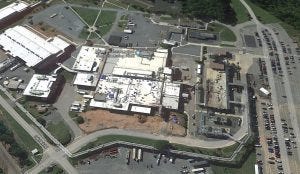Content Spotlight
Podcast: MilliporeSigma says education vital to creating unbreakable chain for sustainability
MilliporeSigma discusses the importance of people, education, and the benefits of embracing discomfort to bolster sustainability efforts.

The expansion in North Carolina will create 300 jobs and is the latest investment by Pfizer in its burgeoning gene therapy network.
The $500 million (€450 million) investment in Sanford, North Carolina will see the Big Pharma firm construct a facility to support production of its recombinant adeno-associated virus (rAAV) vectors for use in its gene therapies and vaccines.
Mike McDermott, president of Pfizer Global Supply, said the Sanford expansion will “strengthen Pfizer’s leadership in gene therapy manufacturing technology” and forms part of a CapEx strategy that will see the firm invest around $5 billion in its US infrastructure over the next few years.

Pfizer’s site in Sanford, North Carolina. Image c/o Google
The Sanford site – constructed in 2017 through a $100 million investment – supports Pfizer’s current gene therapy operations in North Carolina, which includes plants in Chapel Hill and Kit Creek. Kit Creek is a small-scale site aimed at developing processes using flasks and bioreactors between two and 250 liters. The Chapel Hill site works at a 250 liter scale.
The new facility will produce clinical and commercial gene therapies, though Pfizer did not respond to this publication as to its capacity or when it will come online.
Pfizer employs than 3,600 staff in North Carolina, and the new plant will add around 300 more positions.
Pfizer first entered the gene therapy field in 2014 through a collaboration with Spark Therapeutics. In 2016, the firm acquired Bamboo Therapeutics through an upfront $150 million payment, bringing it an advanced recombinant Adeno-Associated Virus (rAAV) vector design and production technology, and the North Carolina Phase I/II gene therapy manufacturing facility.
At the time, Pfizer said it aimed to become “an industry leader in the field of gene therapy,” and has continued to invest in the field.
In 2017, the firm inked a partnership with Sangamo Therapeutics to develop a gene therapy for hemophilia gene therapies. Earlier this year, the firm took a 15% stake in French biotech firm Vivet Therapeutics, whose lead candidate VTX-801 is set enter the clinic as a potential gene therapy for Wilson disease. And last month, Pfizer licensed an AAV delivery platform from REGENXBIO for use in a gene therapy aimed at treating neurodegenerative disease Friedreich’s ataxia.
However, Pfizer is yet to prove itself in the burgeoning field and has been beaten to regulatory success on the pure-play gene therapy front by the likes of Spark Therapeutics and AveXis/Novartis, which have seen the US FDA approve Luxturna (voretigene neparvovec) and Zolgensma (onasemnogene abeparvovec), respectively.
You May Also Like